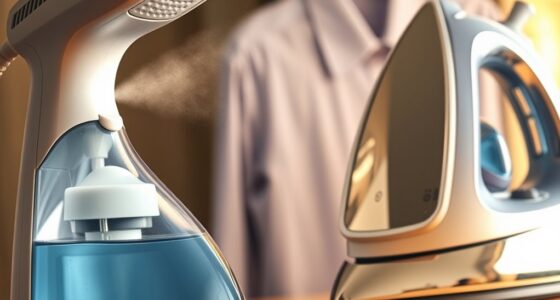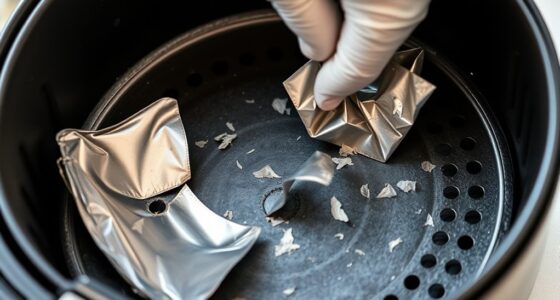When deciding whether to repair or replace your aging appliance, compare repair costs to a new one’s price and consider its age—appliances over 10 years may be more trouble than they’re worth. Think about energy efficiency, environmental impact, and long-term savings—newer models often use less power and save you money over time. If you want to make the best choice for your budget and the environment, exploring these factors further can help guide you.
Key Takeaways
- Compare repair costs to the price of a new appliance; if repairs exceed 50%, replacement may be better.
- Consider the appliance’s age; over 10 years, it likely nears end of lifespan and energy efficiency declines.
- Evaluate long-term costs: frequent repairs and higher energy bills favor replacing the appliance.
- Weigh environmental impact: repairing reduces waste, but newer models improve energy efficiency.
- Assess convenience: repairs are quicker, but new features and better performance may justify replacement.

When your appliance starts acting up, deciding whether to repair or replace it can feel overwhelming. You might wonder if fixing the current issue is worth the expense or if it’s better to invest in a new model altogether. To make an informed choice, start with a thorough cost analysis. Consider the cost of repairs, including parts and labor, and compare it with the price of purchasing a new appliance. Sometimes, repairs can be inexpensive and extend the lifespan of your appliance, especially if it’s relatively new. However, if the repair costs approach or exceed half the price of a new unit, replacing might be the smarter option. Keep in mind that older appliances tend to consume more energy, which can lead to higher utility bills over time. This brings us to the environmental impact: repairing your appliance can be more eco-friendly by reducing waste and the demand for new manufacturing, which consumes resources and generates emissions. Furthermore, newer models often feature improved energy efficiency, which can lower your carbon footprint in the long run. So, weigh the environmental benefits of extending your current appliance’s life against the advantages of upgrading to a more sustainable, energy-efficient device. Additionally, think about the long-term costs. An older appliance might seem economical initially, but if it’s prone to frequent breakdowns, repair costs can add up quickly. In contrast, a new appliance might require a larger upfront investment but could save you money on repairs and energy use over time. Consider also the age of your appliance; if it’s more than 10 years old, chances are it’s nearing the end of its functional lifespan, and replacing it might be the better financial and environmental choice. Furthermore, think about the convenience factor. Repairing an appliance can be quicker than shopping for a new one and waiting for delivery or installation. However, if your current appliance is outdated or inefficient, upgrading could provide you with newer features that improve your daily routine. Ultimately, your decision should balance immediate costs, long-term savings, environmental considerations, and personal convenience. By carefully evaluating repair costs against the benefits of replacing, you can choose the option that best aligns with your budget and values. Remember, sometimes investing in a new, energy-efficient appliance can be a responsible choice that benefits both your wallet and the planet.
Frequently Asked Questions
How Long Should an Appliance Typically Last Before Replacement?
Most appliances have a lifespan of 8 to 15 years, depending on their type and usage. You should consider replacement when your appliance nears its expected lifespan and begins to require frequent repairs or shows signs of inefficiency. Keep an eye on the replacement timeline to avoid costly repairs and energy waste. Regular maintenance can extend your appliance’s life, but knowing when to replace it guarantees you stay efficient and save money in the long run.
Are There Financial Benefits to Repairing Rather Than Replacing?
Yes, repairing your appliance often offers financial benefits when you do a cost analysis. Repair costs tend to be lower than replacement expenses, especially when maintenance costs are factored in. By fixing minor issues early, you can extend your appliance’s lifespan and avoid the higher costs of buying new. This approach saves you money in the short term and helps you get the most value from your current appliance.
What Are the Environmental Impacts of Replacing Appliances?
Replacing appliances is like tossing out an old book; it can have environmental costs. When you choose to replace, you might miss recycling benefits and energy conservation opportunities. Newer models often use less energy and are more eco-friendly, but manufacturing them involves resource extraction and waste. To minimize impacts, consider recycling your old appliance properly and opting for energy-efficient models that help conserve resources over time.
How Can I Tell if My Appliance’s Repair Is Cost-Effective?
You can determine if your appliance’s repair is cost-effective by doing a quick cost analysis. Compare the repair costs with the appliance’s current value and expected lifespan. If repairs are affordable and extend its usability considerably, repair feasibility makes sense. However, if costs are high or the appliance is aging and unreliable, replacing might be a smarter choice. Always weigh the repair expenses against long-term savings and energy efficiency.
What Are Signs My Appliance Has Reached the End of Its Lifespan?
Have you noticed your appliance making strange noises or struggling to perform? These are clear replacement indicators. When your appliance’s lifespan exceeds its typical range—like a refrigerator over 10-15 years or a washer over 8-12 years—it’s likely time to contemplate replacing it. Frequent breakdowns, rising repair costs, and decreased efficiency also signal that your appliance has reached the end of its useful life.
Conclusion
Deciding whether to repair or replace your aging appliance can be tough, but remember, over 60% of homeowners find that replacing an old appliance saves money in the long run. If repairs cost more than half the price of a new unit or the appliance is over 10 years old, replacing might be your best bet. Weigh your options carefully, and you’ll make a choice that keeps your home running smoothly and efficiently.









